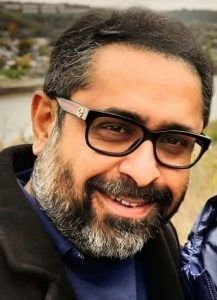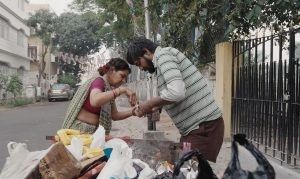SUMAN GHOSH adds to his impressive body of work with The Scavenger of Dreams having its world premiere at the Busan International Film Festival this month.
The multi-award-winning filmmaker presents a powerful drama about a young father struggling to adapt to modernisation and his family’s profession of waste collection. The Indian film starring Sudipta Chakraborty and Shardul Bhardwaj looks at bridging the gap between affluence and extreme poverty.
Having helmed acclaimed films like Podokkhep, Nobel Chor, Shyamal Uncle Turns off the Lights, Kadambari, Basu Poribar and Aadhaar, his latest film is a thought-provoking journey into the intricacies of life.
Eastern Eye caught up with the writer/ director who has divided a successful filmmaking career with working as a professor of economics in Florida to discuss The Scavenger of Dreams. He also spoke about his experience of working with acclaimed actress Sudipta Chakraborty, inspirations and key message of his new film.
Tell us about The Scavenger of Dreams?
My new film is about a waste collector family in Kolkata. Their travails, dreams, aspirations and working conditions form the backdrop of this film. It was inspired by a New York Times article I had read about someone in Silicon Valley, who used to collect waste from a locality of billionaires. He collects the waste and doesn’t sell it. He keeps it in his house and revels in that. I found that very interesting.
Why is that?
That connection with the lowest strata of society, namely waste collectors, and the highest strata in terms of economic well-being, IT titans and billionaires, through the garbage that is disposed. So, through the garbage, the connection between the richest strata of society and the most underprivileged is something I found interesting. That was the seed of how I started the journey about this film.
How does this compare to other films you have done?
This was a unique journey in the sense that in my film, only the main two protagonists played by Shardul Bhardwaj and Sudipta Chakraborty are professional actors. Others are real waste collectors from Kolkata. I wanted to enmesh the journey of my actors with real characters and that was a very interesting experiment for me.

Tell us about that realism…
So, the way this film has also been shot has a degree of realism. So, it is a mixture of genres between documentary and feature film. That is what I wanted to experiment with in this film. I make films of different genres, including historical pieces, surrealist films and all. So, it depends on the story and how I want to communicate that story to the audience. For The Scavenger of Dreams, I definitely felt that realism was very, very important. So, the way we shot the film also brings out that aspect.
What is your favourite moment in The Scavenger of Dreams?
Well, there are several moments, but I would say that there was a scene where Birju, our protagonist, is chatting with his friends before disposing of their garbage to go to the main dumping ground, and one waste collector who plays himself, breaks down while chatting as his brother had died the night before and it was in reality. The film actually had no script as such.
Really? Tell us about how you structured the story?
For each scene I wrote the summary of what I want, and it was the responsibility of my main professional actors to bring out that truth from any particular scene. I didn’t want to restrict their body language or truth of the scene with my dialogues. So, I submerged the actors in their research with the waste collectors so that what comes out is the real dialogue. When Shardul heard the story of the brother’s passing, he was completely heartbroken. That is captured in the film. I could not expect such truth to come out from any particular scene if it was scripted. So, that is a very favourite moment.
Who are you hoping connects with this film?
I’m hoping a wide strata of society connects with the film. See, we live our life very privileged, where we don’t bother to look back at the people who are providing basic necessities, including garbage collection. To be very honest before I embarked on this project, I never thought about who collected garbage from my home in Kolkata and that in itself was a revelation for me, and the entire cast and crew.
Tell us about that?
Their personal earnings are $2.5 (£2.05) a day. I had no idea that people live like this. So, it was a revelation as human beings for all of us. And hence I would like to transform this feeling of a general empathy for our fellow human beings through this film, which I hope connects to a wider audience.
 What do you like most like about Sudipta Chakraborty as an actress?
What do you like most like about Sudipta Chakraborty as an actress?
This is my fourth film with Sudipta. As I age as a filmmaker, what I look for is actors who can communicate the truth very well and honestly. And Sudipta is a very sincere actor. I think we understand each other very well, which helps both of us. She knows what I am aiming for. I also know what I can get from her, so the communication becomes easier. I think Sudipta is a wonderful combination of a prepared and spontaneous actress.
How do you feel about this film premiering in Busan?
Busan is my home in a sense. I have had many films premiere there. It’s a festival that has grown in leaps and bounds. To compete and be there among the best globally is a big honour. To be very honest, when I was making the film, I told my cast and crew to forget about any consequences of festivals. I wanted us to connect with the truth of waste collectors we are portraying. Having a world premiere in Busan is very satisfying.
What inspires you as a filmmaker?
I have done around 10 or 11 films, and each is a deep dive into a new world. Whether it is films based on literature or ones in a very modern contemporary setting, all have given a different experience. When you work on a film, you soak yourself in that world. Somehow, I get a vicarious pleasure of being in a different era or place and interacting with characters, which are not me. Ultimately that cinema is an expression of empathy, and to generate empathy helps me as a human being. So, each journey of a film is an exercise in empathy and that is what I really love.
What is the key message of the film?
The key message I would say, is we should think about this world being in this age of globalisation and modernisation. We are racing ahead, but there is a huge shift of us in the labour class. Globally many human beings are being left behind. I think as human beings we should bother about what is happening to the people who are left behind, and whether we can do anything about that. I hope this film will raise questions on thinking about such issues in this modern world.
Why do you love cinema?
Cinema gives me an avenue to soak into different cultures, worlds, eras, and periods. That is very refreshing, and I would say a cathartic exercise of making cinema. I love cinema because my exposure to a lot of the world has been through cinema, and that is what I aspire to do as a human being, so this medium is really very apt for that.
